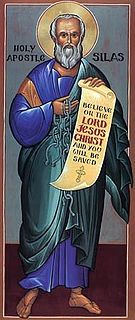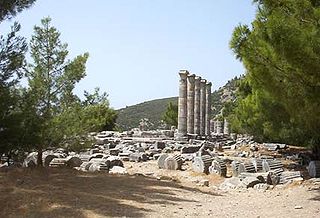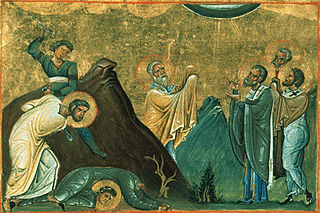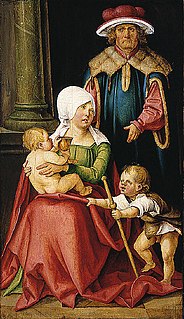
The King James Version (KJV), also known as the King James Bible (KJB) or simply the Authorized Version (AV), is an English translation of the Christian Bible for the Church of England, begun in 1604 and completed as well as published in 1611 under the sponsorship of James VI and I. The books of the King James Version include the 39 books of the Old Testament, an intertestamental section containing 14 books of the Apocrypha, and the 27 books of the New Testament. The translation is noted for its "majesty of style", and has been described as one of the most important books in English culture and a driving force in the shaping of the English-speaking world.

Silas or Silvanus was a leading member of the Early Christian community, who accompanied Paul the Apostle on parts of his first and second missionary journeys.
The son of perdition is a phrase associated with a demoniacal title that appears in the New Testament in the Gospel of Saint John 17:12 and in the Second Epistle to the Thessalonians 2:3.

The Battle of Mycale was one of the two major battles that ended the second Persian invasion of Greece during the Greco-Persian Wars. It took place on or about August 27, 479 BC on the slopes of Mount Mycale, on the coast of Ionia, opposite the island of Samos. The battle was fought between an alliance of the Greek city-states, including Sparta, Athens and Corinth, and the Persian Empire of Xerxes I.

Bethabara is the name used by some versions of the New Testament for the site "beyond the Jordan" where John the Baptist preached and performed baptisms, where he met with a group of priests and Levites sent by the Pharisees to investigate his ministry, and where he baptised Jesus. The name "Bethabara" also appears on the 6th-century Madaba Map and in the Talmud.

Mycale. also Mykale and Mykali, called Samsun Dağı and Dilek Dağı in modern Turkey, is a mountain on the west coast of central Anatolia in Turkey, north of the mouth of the Maeander and divided from the Greek island of Samos by the 1.6 km wide Mycale Strait. The mountain forms a ridge, terminating in what was known anciently as the Trogilium promontory. There are several beaches on the north shore ranging from sand to pebbles. The south flank is mainly escarpment.

The Panionium was an Ionian sanctuary dedicated to Poseidon Helikonios and the meeting place of the Ionian League. It was on the peninsula of Mt. Mycale, about 100 kilometres (62 mi) south of Smyrna—now İzmir, in Turkey. Herodotus describes it as follows:
The Panionion is a sacred ground in Mykale, facing north; it was set apart for Poseidon of Helicon by the joint will of the Ionians. Mykale is a western promontory of the mainland opposite Samos; the Ionians used to assemble there from their cities and keep the festival to which they gave the name of Panionia.
According to the Bible, Blastus was the chamberlain of Herod Agrippa, a mediator for the Sidonians and Tyrians, and was believed to be involved in the events that led to Herod's death.

Luke 24 is the twenty-fourth and final chapter of the Gospel of Luke in the New Testament of the Christian Bible. It records the discovery of the resurrection of Jesus Christ, his appearances to his disciples and his ascension into heaven. The book containing this chapter is anonymous, but early Christian tradition uniformly affirmed that Luke composed this Gospel as well as the Acts of the Apostles.
Abila – also biblical: Abel-Shittim or Ha-Shittim – was an ancient city east of the Jordan River in Moab, later Peraea, near Livias, about twelve km. northeast of the north shore of the Dead Sea; the site is now that of Abil-ez-Zeit, Jordan.

Jehovah is a Latinization of the Hebrew יְהֹוָה, one vocalization of the Tetragrammaton יהוה (YHWH), the proper name of the God of Israel in the Hebrew Bible and one of the seven names of God in Judaism.

Erastus, also known as Erastus of Paneas, is a person in the New Testament. According to the Epistle to the Romans, Erastus was a steward in Corinth, a political office of high civic status. The word is defined as "the manager of household or of household affairs" or, in this context, "treasurer"; The King James Version uses the translation "chamberlain", while the New International Version uses "director of public works". A person named Erastus is also mentioned in the 2 Timothy and Acts, and these mentions are usually taken to refer to the same person.
Mnason was a first-century Cyprian Christian, who is mentioned in chapter 21 of the Acts of the Apostles as offering hospitality to Luke the evangelist, Paul the apostle and their companions, when they travelled from Caesarea to Jerusalem. The wording of the verse that mentions Mnason has prompted debates about whether Mnason accompanied the travellers on their journey or merely provided lodging, and whether his house was in Jerusalem or in a village on the way to Jerusalem. Although only mentioned in one verse, many Christians have drawn lessons from the example of Mnason about persevering in the Christian faith and the exercise of hospitality.

The island of Samos had participated in the Greek War of Independence and had successfully resisted several Turkish and Egyptian attempts to occupy it, but it was not included with the boundaries of the newly independent Kingdom of Greece after 1832. Instead, in 1834 the island was granted self-government as a semi-independent state, the Principality of Samos.
The Gulf of Kuşadası is a small gulf and strait in the Aegean Sea, separating the Greek island of Samos from the mainland of Turkey. Kuşadası is a resort town on Turkey's western Aegean coast, on the Gulf of Kuşadası. Samos in Greece borders the Gulf of Kuşadası to the north and east, and the mainland of Turkey borders the Gulf of Kuşadası to the west. The Mycale Strait also separates Samos Island from the Turkish mainland, and connects the Gulf of Kuşadası to the waters southwest of Turkey and south of the island of Samos.

Revelation 1 is the first chapter of the Book of Revelation or the Apocalypse of John in the New Testament of the Christian Bible. The book is traditionally attributed to John the Apostle, but the precise identity of the author remains a point of academic debate.

Zebedee, according to all four Canonical gospels, was the father of James and John, two disciples of Jesus. The gospels also suggest that he was the husband of Salome: whereas Mark 15:40 names the women present at the crucifixion as "Mary Magdalene, and Mary the mother of James the Less and of Joses, and Salome", the parallel passage in Matthew 27:56 has "Mary Magdalene, and Mary the mother of James and Joses, and the mother of Zebedee's children." The Catholic Encyclopedia concludes that the Salome of Mark 15:40 is probably identical with the mother of the sons of Zebedee in Matthew.

Acts 28 is the twenty-eighth chapter of the Acts of the Apostles in the New Testament of the Christian Bible. It records the journey of Paul from Malta to Italy until finally settled in Rome. The book containing this chapter is anonymous, but early Christian tradition uniformly affirmed that Luke composed this book as well as the Gospel of Luke.

Romans 3 is the third chapter of the Epistle to the Romans in the New Testament of the Christian Bible. It is authored by Paul the Apostle, while he was in Corinth in the mid 50s CE, with the help of an amanuensis (secretary), Tertius, who adds his own greeting in Romans 16:22.



















